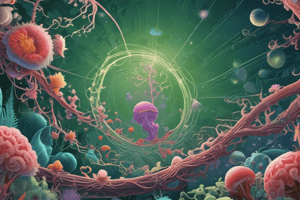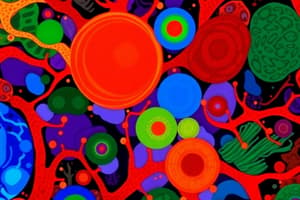Podcast
Questions and Answers
Which process is utilized by plants to convert sunlight into food?
Which process is utilized by plants to convert sunlight into food?
- Cellular Respiration
- Enzyme Activity
- Photosynthesis (correct)
- Transport
What is the primary function of enzymes in living organisms?
What is the primary function of enzymes in living organisms?
- Synthesizing proteins
- Transporting molecules
- Converting signals
- Catalyzing biochemical reactions (correct)
Which level of biological organization comes after the 'cell' level?
Which level of biological organization comes after the 'cell' level?
- Organ
- Molecule
- Organ System
- Tissue (correct)
Which term describes the global sum of all ecosystems?
Which term describes the global sum of all ecosystems?
What factor does NOT influence biodiversity?
What factor does NOT influence biodiversity?
What process allows cells to convert one signal into another, aiding in communication?
What process allows cells to convert one signal into another, aiding in communication?
What is the primary role of transport processes in organisms?
What is the primary role of transport processes in organisms?
Which of the following best defines a community in biological terms?
Which of the following best defines a community in biological terms?
What does Molecular Biology primarily study?
What does Molecular Biology primarily study?
Which concept describes the ability of an organism to maintain a stable internal environment?
Which concept describes the ability of an organism to maintain a stable internal environment?
What is the focus of Ecology as a branch of biology?
What is the focus of Ecology as a branch of biology?
What does the Cell Theory state?
What does the Cell Theory state?
What does Evolutionary Biology examine?
What does Evolutionary Biology examine?
Which of these is a key concept that involves the change of heritable characteristics over generations?
Which of these is a key concept that involves the change of heritable characteristics over generations?
Which domain includes organisms with complex cells that have a nucleus?
Which domain includes organisms with complex cells that have a nucleus?
Which process involves synthesizing a functional product through genetic information?
Which process involves synthesizing a functional product through genetic information?
Flashcards
Biology Definition
Biology Definition
The study of life and living organisms, their structure, function, growth, origins, evolution, distribution, and taxonomy.
Cell Theory
Cell Theory
All living things are made of cells, the basic units of structure and function.
Homeostasis
Homeostasis
An organism's ability to keep a stable internal environment despite outside changes.
Metabolism
Metabolism
Signup and view all the flashcards
Evolution
Evolution
Signup and view all the flashcards
Molecular Biology
Molecular Biology
Signup and view all the flashcards
Eukarya
Eukarya
Signup and view all the flashcards
Prokaryotes
Prokaryotes
Signup and view all the flashcards
Photosynthesis
Photosynthesis
Signup and view all the flashcards
Cellular Respiration
Cellular Respiration
Signup and view all the flashcards
Transport
Transport
Signup and view all the flashcards
Signal Transduction
Signal Transduction
Signup and view all the flashcards
Enzyme Activity
Enzyme Activity
Signup and view all the flashcards
Atom
Atom
Signup and view all the flashcards
Macromolecule
Macromolecule
Signup and view all the flashcards
Biodiversity
Biodiversity
Signup and view all the flashcards
Study Notes
Introduction to Biology
- Biology is the natural science that studies life and living organisms, including their structure, function, growth, origin, evolution, distribution, and taxonomy.
- It encompasses a vast array of disciplines, from molecular biology to ecology.
- Biology explores the intricate relationships between organisms and their environment.
Branches of Biology
- Molecular Biology: Focuses on the structure and function of biological molecules like proteins, DNA, and RNA.
- Cell Biology: Examines the structure and function of cells, the basic units of life.
- Genetics: Studies heredity and the variation of inherited characteristics. It includes the mechanisms of inheritance and the role of genes in development and function.
- Developmental Biology: Investigates the processes by which organisms grow and develop from a single cell to a complex multicellular organism.
- Evolutionary Biology: Explores the processes that have shaped the diversity of life on Earth, focusing on common ancestry and adaptation.
- Ecology: Studies the interactions between organisms and their environment, considering populations, communities, ecosystems, and the biosphere.
Fundamental Concepts in Biology
- The Cell Theory: All living things are composed of cells, and cells are the basic units of structure and function in living organisms.
- Homeostasis: The ability of an organism to maintain a stable internal environment despite changes in the external environment.
- Metabolism: The sum of all chemical reactions that occur within an organism to maintain life.
- Reproduction: The process by which organisms produce new organisms. This includes both asexual and sexual reproduction.
- Evolution: The change in the heritable characteristics of biological populations over successive generations. This is driven by natural selection.
- Gene Expression: The process by which information from a gene is used to synthesize a functional gene product, such as a protein.
- Energy Flow: The transfer of energy through biological systems, from the sun (primary producers) to consumers, decomposers, and all other levels of the food web.
Key Domains of Life
- Bacteria: Prokaryotic single-celled organisms.
- Archaea: Prokaryotic single-celled organisms that often inhabit extreme environments.
- Eukarya: Organisms with complex cells (eukaryotic), possessing a nucleus and membrane-bound organelles. This domain includes protists, fungi, plants, and animals.
Processes of Life
- Photosynthesis: The process by which plants and some other organisms use sunlight to synthesize foods from carbon dioxide and water.
- Cellular Respiration: The process by which cells break down glucose and other food molecules to release energy.
- Transport: The movement of molecules and substances within organisms, often across cell membranes.
- Signal Transduction: The process by which a cell converts one kind of signal or stimulus into another. This enables control and communication within organisms.
- Enzyme Activity: Enzymes are proteins that catalyze biochemical reactions within living organisms.
Levels of Biological Organization
- Atom: The basic unit of matter.
- Molecule: A group of atoms bonded together.
- Macromolecule: A large molecule composed of smaller subunits. Examples include proteins, carbohydrates, lipids, and nucleic acids.
- Organelle: A specialized subunit within a cell that performs a specific function.
- Cell: The basic unit of life.
- Tissue: A group of similar cells that perform a specific function.
- Organ: A group of tissues that work together to perform a specific function.
- Organ System: A group of organs that work together to perform a related set of functions.
- Organism: An individual living thing.
- Population: A group of individuals of the same species living in the same area.
- Community: All the populations of different species living and interacting in a specific area.
- Ecosystem: A community of organisms and their physical environment interacting.
- Biosphere: The global sum of all ecosystems.
Biodiversity
- Biodiversity refers to the variety of life on Earth at all its levels, from genes to ecosystems.
- Factors driving biodiversity include evolutionary processes, environmental conditions, and interactions among organisms.
- Biodiversity is essential for the stability and functioning of ecosystems.
Studying That Suits You
Use AI to generate personalized quizzes and flashcards to suit your learning preferences.



